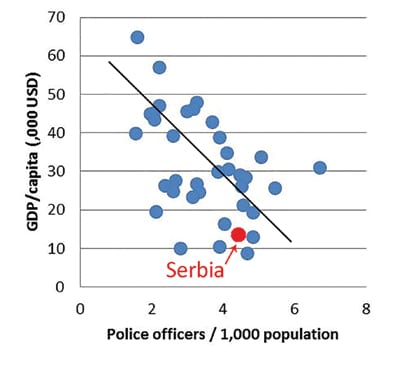Most people will behave honestly if they think others will. But if they expect the law will not be enforced, they will accept criminal behaviour without complaint even if they are its victims, and no amount of policing will help
A recent article in The Economist began: “It is easy to forget that even the most trivial commercial transactions rely on small acts of trust. Laws encourage good behaviour, but states lack the resources to force everyone to be good all the time. Trust keeps society running. Just ordering a pizza requires faith that the dough will be well made, that the pizzeria will not abuse the customer’s credit card information and that the delivery man will not abscond with the cargo. More complex partnerships, of the kind that make long-run economic growth possible, require much higher degrees of trust.
 ”It is not easy to quantify things like trust, but if we compare, say, the number of police officers in a country with its wealth, we find a clear correlation. People who trust each other grow richer, and low-trust societies “waste piles of time and money defending vulnerable stores of wealth”.
”It is not easy to quantify things like trust, but if we compare, say, the number of police officers in a country with its wealth, we find a clear correlation. People who trust each other grow richer, and low-trust societies “waste piles of time and money defending vulnerable stores of wealth”.
Serbia’s GDP per capita takes 35th place among the countries covered. And trust? Well, when did you last hear someone say: “My competitors are well connected, but since I offer a better product for the price, I am confident of winning the contract”?
The problem with trust is that it is hard to build. Trust depends less on the rules and systems of society and the people that populate it, more on its organisational culture, whether that organisation is a company or a state. Culture depends on a shared history, and the expectations people draw from it about how others will behave. To change a culture, you must change people’s expectations.
You can train people to behave correctly, but their training will remain theoretical if they expect others not to follow it
Most people will behave honestly if they think others will. But if they expect the law will not be enforced, they will accept criminal behaviour without complaint even if they are its victims, and no amount of policing will help. When they are tempted to use corrupt methods, they will say, “If I don’t, someone else will”.
You can train people to behave correctly, but their training will remain theoretical if they expect others not to follow it. You can educate children to be honest, but if they hear another story from their parents, they will become cynical and reject all civic education as false.
Can expectations be changed?
They can, on three conditions. The first condition is the total commitment from top management. If the CEO is against, or even lukewarm, the change will not happen. Senior leaders must be seen to be leading the change, and they must do so convincingly, perceptions are all-important.
Secondly, enforcement of the law must be massively prioritised, with cases of breach of trust being prosecuted rapidly, effectively and publicly. High profile offenders must be an early target to avoid cynicism – “Is this just one more publicity stunt that will make a scapegoat of some small fry?”  The hammer must fall on both public and private sector actors together since it takes both to funnel public money into private pockets. Targeting either one on its own will look unfair and will fail to change attitudes.
The hammer must fall on both public and private sector actors together since it takes both to funnel public money into private pockets. Targeting either one on its own will look unfair and will fail to change attitudes.
Thirdly, public awareness campaigns must capture people’s imagination and give them hope. They must be maintained and repeated for long periods. Such campaigns are proven to work: few in Western Europe now complain about a smoking ban in public places, even though people said “it could never work here” in every country.
NALED’s “Ask When” video series has shown it can master the art of public awareness when the government is ready for change. A similar campaign could galvanise anti-corruption efforts and induce ethical behaviour in business.
As an organisation that groups private, public and civil sectors, NALED is uniquely placed to generate trust through debate and publicity.
But only if the first two strategic conditions are met. When these are right, change can happen if we are aware that it is the whole historic public/private business culture that must be changed before it eats the strategy. This takes commitment and perseverance. A new history must be built. With the right conditions, our children may want to return to work in a prosperous Serbia in 20 years’ time. You are part of this culture: what are your expectations? Will they?